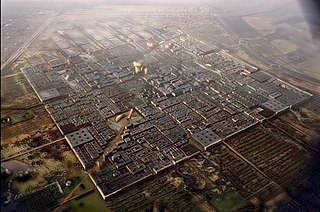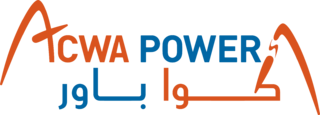
The United Arab Emirates is a high-income developing market economy. The UAE's economy is the 4th largest in the Middle East, with a gross domestic product (GDP) of US$415 billion in 2021-2023.

FGB was the third largest bank by assets in the United Arab Emirates (UAE), until it merged with the National Bank of Abu Dhabi in December 2016 to form First Abu Dhabi Bank, creating the largest bank by assets in the UAE. Established in 1979, FGB is headquartered in the Emirate of Abu Dhabi. FGB offers a wide range of financial services in the wholesale, consumer, and treasury banking sectors, including Islamic banking and bancassurance solutions for businesses and consumers via a network of branches across the UAE. Internationally, FGB has a branch in Singapore - that includes global wealth management services and a branch in Qatar, representative offices in London, India, Hong Kong, and Seoul, South Korea, and a subsidiary in Libya.
Ahmed Ali Al Sayegh is an Emirati politician who is a minister of state in the United Arab Emirates since 19 September 2018.

Masdar (Arabic:مصدر), also known as the Abu Dhabi Future Energy Company, is an Emirati state-owned renewable energy company. It was founded and chaired by Sultan Al Jaber in 2006 as a subsidiary of Mubadala Investment Company. The company is responsible for development of Masdar City, which headquarters the International Renewable Energy Agency.

The Emirate of Abu Dhabi is one of seven emirates that constitute the United Arab Emirates. It is the largest emirate, accounting for 87% of the nation's total land area or 67,340 km2 (26,000 sq mi).

The Arab Monetary Fund (AMF) is a regional Arab organization, a working sub-organization of the Arab League. It was founded 1976, and has been operational since 1977.

Masdar City is an urban community in Abu Dhabi, the capital of the United Arab Emirates. It was built by Masdar, a subsidiary of the state-owned Mubadala Investment Company, with the majority of seed capital provided by the Government of Abu Dhabi.

Abu Dhabi is the capital city of the United Arab Emirates (UAE). The city is the seat of the Abu Dhabi Central Capital District, the capital city of the Emirate of Abu Dhabi, and the UAE's second-most populous city after Dubai.
The Abu Dhabi National Energy Company, PJSC (TAQA) is a government controlled energy holding company of Abu Dhabi, United Arab Emirates.

Shams Solar Power Station is a concentrating solar power station near Madinat Zayed, Abu Dhabi, the United Arab Emirates. The solar power station is located approximately 120 kilometres (75 mi) southwest of Abu Dhabi and 6 kilometres (4 mi) from Madinat Zayed on the road from Tarif to the Liwa Oasis.
Enviromena is a clean energy technology company in Europe. It has installed more than 17,000 solar systems. The company has over 425 MW of solar power plants under operation and a further 200 MW under construction.

Sultan Ahmed Al Jaber, is an Emirati politician who is the minister of industry and advanced technology of the United Arab Emirates, head of the Abu Dhabi National Oil Company (ADNOC), and chairman of Masdar.

ACWA Power is a developer, investor, co-owner and operator of a portfolio of power generation and desalinated water production plants with a presence in 13 countries across the Middle East, Africa, Central and South-East Asia. ACWA Power's portfolio of projects in operation and development has an investment value of USD 85.7 billion, and a capacity of 55.1 GW of power and 8 million m3/day of desalinated water.

While being a major oil producing country, the United Arab Emirates (UAE) has taken steps to introduce solar power on a large scale. However, solar power still accounts for a small share of energy production in the country. The country was the 6th top carbon dioxide emitter per capita in the world in 2009, with 40.31 tonnes, but is planning to generate half of its electrical energy by 2050 from solar and nuclear sources, targeting 44% renewables, 38% gas, 12% coal, and 6% nuclear energy sources.

Mohammed bin Rashid Al Maktoum Solar Park is a solar park spread over a total area of 77 km2 (30 sq mi) in Saih Al-Dahal, about 50 km (31 mi) south of the city of Dubai in the United Arab Emirates (UAE).
Foreign aid from the United Arab Emirates is provided in the form of assistance, grants and loans through both the government and nongovernmental organizations. These projects provided to other countries deal with healthcare, infrastructure, development, alleviating poverty, responding to natural disasters, refugees and internally displaced people.

Francesco La Camera is an Italian civil servant, academic, diplomat who was elected the second Director-General of the International Renewable Energy Agency (IRENA), and assumed office on 4 April 2019. At the IRENA, he has a four-year tenure, after succeeding Adnan Z. Amin of Kenya, who served in a two-term tenure from 2011 to 2019 and has been given the honorary title of Director-General Emeritus. La Camera's election took place in the context of the Ninth Session of the annual Assembly of the International Renewable Energy Agency in Abu Dhabi. La Camera was previously the Director-General for Sustainable Development, Energy and Climate at the Italian Ministry of Environment, Land and Sea, where he was involved in international cooperation and partnerships agreements globally, especially in Small Island Developing States (SIDS).

Sheikh Khaled bin Mohamed bin Zayed Al Nahyan is crown prince of Abu Dhabi. He was appointed to the role on 29 March 2023. He is the eldest son of Sheikh Mohamed bin Zayed Al Nahyan, 3rd president of the United Arab Emirates.
The Abu Dhabi Investment Office (ADIO) is an Emirate-based company focused on investment for investors and companies in the Emirate of Abu Dhabi. It is the central government hub supporting investment in Abu Dhabi, responsible for private sector growth and economic diversification.
The Blitta Solar Power Station is an operational 50 MW (67,000 hp) solar power plant in Togo. The power station was developed by Amea Power, an independent power producer (IPP), based in the United Arab Emirates. The solar farm, which is the largest grid-ready in Togo, is also referred to as Mohamed Bin Zayed Power Station, named after His Highness Sheikh Mohamed bin Zayed Al Nahyan, the Crown Prince of Abu Dhabi. The power station began commercial operations in June 2021.














